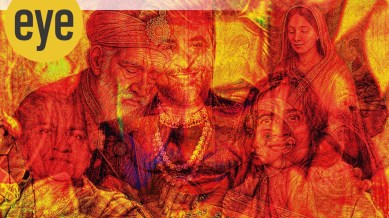Why no one sings this song anymore
Poet Muztar Khairabadi may not be a household name but in an age of noise and neglect, his works remind us that presence matters more than praise

It begins not with a memory but with a murmur. A hush, a hum, hovering in the hallway of childhood — like steam rising from rice, like the slow stir of dal in a copper pot, like whispers of wind through an old mesh window. Somewhere between a sari’s pallu and the scent of naphthalene in winter shawls, I would hear it.
Na kisi ki aankh ka noor hoon, na kisi ke dil ka qarar hoon… I didn’t understand the words, not then. But I felt them. Felt melancholy drape itself around me like a shawl on cold shoulders. Felt the ache — too elegant to call pain, too lyrical to call loss. My mother and her sister, Aruna Mausi, would sit cross-legged, voices twining into one another, their notes lingering in the air like incense smoke, like sighs spun into song, turning even Delhi’s dry summer into sepia rain.
Nothing more. Nothing less).
I must have been eight when I heard that line whole. And suddenly I understood what it meant to feel like you belonged nowhere — not even to your own name.
There was cinema in the way the women sang it. Their eyes brimmed but never spilled. Their hands paused mid-stir, as if movement might break the fragile spell. My father, too, sang — but softly, shyly, as if wary the world might overhear how it bruised him.
Main woh bekasi ka mazaar hoon…(I am the grave of helplessness. Not even a beloved’s tomb — only helplessness itself).
This ghazal, dignified in its devastation, taught me more about the human condition than any classroom. It was honesty without ornament, sorrow without spectacle. It never begged, never boasted. It simply sat, like a tired traveller at a bus stop bench, waiting for a ride that never came.
It taught me shame — not the loud shame society serves, but the soft shame of solitude. The shame of being unseen, of not fitting someone else’s script, of loving invisibly.
Na dawa-e-dard-e-jigar hoon main, na kisi ki meethi nazar hoon main…(I am no cure for heartbreak. Not even a sweet memory).
Even now, those words undo me. There is no pride here, only presence. Perhaps that’s why they pierce across centuries. My Gen-Z cousin once posted them on Instagram with a sigh emoji. In that emoji I heard Muztar’s heartbreak, my mother’s timbre, Mausi’s cadence and a curated grid collapse into the same ache.
This ghazal is exile — not just of nations, but of names, of friendships, of lovers. It reminds us: some of us are not poetry in anyone’s diary. Some of us are only the crossed-out margins. Mera rang-roop bigad gaya, jo khizaan se baagh ujad gaya…(My colours faded, my face withered, like a garden stripped bare by autumn).
How many walk this world as gardens in khizaan — waiting for spring they no longer believe in, still fragrant in forgotten ways?
And then there was Deepa Bua. She did not just sing the words. She inhabited them. She felt their loss, lived their longing, owned their meaning, pulsed with their breadth. Her voice was less recital than revelation, less melody than marrow. It was lament and lullaby, rhythm and requiem. When she sang, language itself seemed to lean closer, listening for its own echo. That is Muztar’s gift — his words are not monuments but mirrors.
Na main laag hoon, na lagav hoon, na suhag hoon, na subhaav hoon…(I am neither affection nor attachment, neither joy nor companionship).
Identity is sometimes not what we are, but what we are not. To be no one’s noor, no one’s qarar, is to be your own.
Main nahi hoon namaz-e-jaan-fiza, mujhe sun ke koi karega kya…(I am not the prayer that gives life. Who would even care to hear me)?
Who has not asked this? Would anyone notice if I disappeared? This ghazal gave me permission to cradle that doubt, not cast it away.